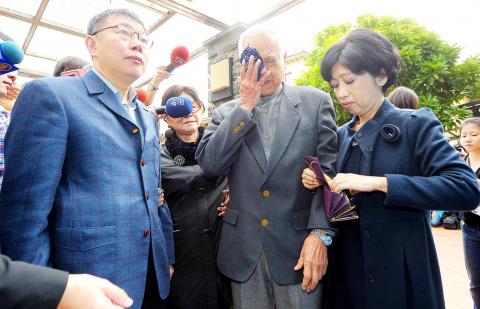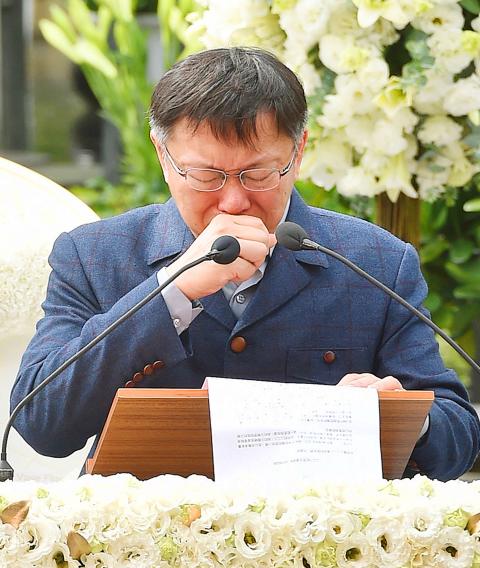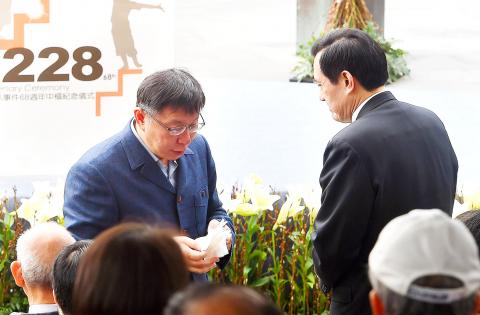The painful history of the 228 Incident — and the torment and grief that families of its victims still feel — were brought into sharp focus yesterday by Taipei Mayor Ko Wen-je (柯文哲) when he delivered an emotional speech at the government’s memorial ceremony, after which it appeared that he refused to shake hands with President Ma Ying-jeou (馬英九).
During his address at the 228 Memorial Park in Taipei yesterday, Ko choked up several times when talking about his grandfather, Ko Shih-yuan (柯世元), who survived the 228 Incident in 1947, but died three years later of the injuries he reportedly suffered after torture and beatings by Chinese Nationalist Party (KMT) troops.
Ko Wen-je’s father, Ko Cheng-fa (柯承發), also attended the event.

Photo provided by Taipei Photojournalists Association
It was the mayor’s first time addressing a national audience at a 228 memorial since taking office.
Ma, Premier Mao Chih-kuo (毛治國) and other KMT government officials were also in attendance.
Ko is the first Taipei mayor whose family suffered directly in the 228 Massacre, and he was invited to represent victims’ families.

Photo: Liao Chen-hui, Taipei Times
Observers said that his taking the central stage at the memorial was an important occasion, charged with political symbolism and historic meaning for Taiwanese.
“Just how painful was the aftermath of the 228 Incident? It is suffering that went beyond words. My father never wanted to talk about what happened to his father. He did not want our generation to bear the suffering of the older generation,” Ko Wen-je said.
“We must have the truth; then we may forgive. Only then can we have reconciliation and peace,” he added. “We must not allow such a tragedy to happen to our children and our grandchildren. This is the responsibility of our generation. Only when there is justice in government can we have harmony in society — and have a future for our nation.”

Photo: Liao Chen-huei, Taipei Times
“Not knowing much about my grandfather, I learned about him from history and from old photographs. I got to know about my grandfather only by the tears my father shed at each year’s 228 commemoration services,” he said.
“During that sorrowful and grieving time of 1947, many Taiwanese lost their families, relatives and friends,” he said. “Society also lost many intellectuals and its elite. It also left a legacy of fear and terror in Taiwan’s history, which resulted in silence and divisions between people, creating an invisible, cold-hearted wall that still divides society today.”
Ko Wen-je frequently wiped away tears.
After his speech, he twice appeared to decline shaking hands with Ma.
As Ma first offered a handshake, Ko waved his hand in a gesture of refusal after leaving the podium. At the end of the ceremony, Ma shook hands with family members of victims and again offered his hand to Ko, who apparently refused again.
Ko Wen-je’s mother, Ho Jui-ying (何瑞英), dismissed speculation over her son’s behavior when reporters sought comment later in the afternoon about the episode, which triggered a flurry of media reports.
It would have been rude for Ko to shake hands with the president, because her son was holding a soiled tissue, Ho said.
“He could not just throw the tissue on the ground out there. With the tissue in his hand, he was unable to shake President Ma’s hand,” she said.
During yesterday’s event, several groups organized separate protests against Ma and the KMT outside the ceremony venue.
Protest organizers and participants including the Taiwanese National Party, the Organization for Taiwanese National Declaration and the Taijimen group, which led to brief confrontations with police officers deployed to provide security.
Additional reporting by Shih Hsiu-chuan

The US government has signed defense cooperation agreements with Japan and the Philippines to boost the deterrence capabilities of countries in the first island chain, a report by the National Security Bureau (NSB) showed. The main countries on the first island chain include the two nations and Taiwan. The bureau is to present the report at a meeting of the legislature’s Foreign Affairs and National Defense Committee tomorrow. The US military has deployed Typhon missile systems to Japan’s Yamaguchi Prefecture and Zambales province in the Philippines during their joint military exercises. It has also installed NMESIS anti-ship systems in Japan’s Okinawa

‘WIN-WIN’: The Philippines, and central and eastern European countries are important potential drone cooperation partners, Minister of Foreign Affairs Lin Chia-lung said Minister of Foreign Affairs Lin Chia-lung (林佳龍) in an interview published yesterday confirmed that there are joint ventures between Taiwan and Poland in the drone industry. Lin made the remark in an exclusive interview with the Chinese-language Liberty Times (the Taipei Times’ sister paper). The government-backed Taiwan Excellence Drone International Business Opportunities Alliance and the Polish Chamber of Unmanned Systems on Wednesday last week signed a memorandum of understanding in Poland to develop a “non-China” supply chain for drones and work together on key technologies. Asked if Taiwan prioritized Poland among central and eastern European countries in drone collaboration, Lin

ON ALERT: Taiwan’s partners would issue warnings if China attempted to use Interpol to target Taiwanese, and the global body has mechanisms to prevent it, an official said China has stationed two to four people specializing in Taiwan affairs at its embassies in several democratic countries to monitor and harass Taiwanese, actions that the host nations would not tolerate, National Security Bureau (NSB) Director-General Tsai Ming-yen (蔡明彥) said yesterday. Tsai made the comments at a meeting of the legislature’s Foreign Affairs and National Defense Committee, which asked him and Minister of National Defense Wellington Koo (顧立雄) to report on potential conflicts in the Taiwan Strait and military preparedness. Democratic Progressive Party (DPP) Legislator Michelle Lin (林楚茵) expressed concern that Beijing has posted personnel from China’s Taiwan Affairs Office to its

BACK TO WORK? Prosecutors said they are considering filing an appeal, while the Hsinchu City Government said it has applied for Ann Kao’s reinstatement as mayor The High Court yesterday found suspended Hsinchu mayor Ann Kao (高虹安) not guilty of embezzling assistant fees, reducing her sentence to six months in prison commutable to a fine from seven years and four months. The verdict acquitted Kao of the corruption charge, but found her guilty of causing a public official to commit document forgery. The High Prosecutors’ Office said it is reviewing the ruling and considering whether to file an appeal. The Taipei District Court in July last year sentenced Kao to seven years and four months in prison, along with a four-year deprivation of civil rights, for contravening the Anti-Corruption